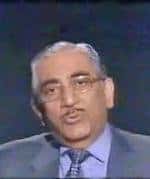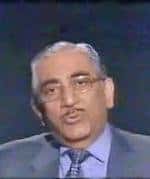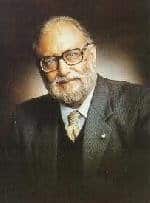Member Science & Technology, Planning Commission of Pakistan Ex.Chairman National Engineering & Scientific Commission (NESCOM)

Samar Mubarakmand is a Pakistani nuclear physicist known for his research in gamma spectroscopy and experimental development of the linear accelerator.He came to public attention as the director of the team responsible for the performing the country’s first and successful atomic tests (see Chagai-I and Chagai-II) in the Chagai weapon testing laboratories, located in the Balochistan Province of Pakistan.Prior to that, he was the project director of the integrated missile programme and supervised the development of first Shaheen-I missile program in 1995. He was also the founding chairman of Nescom from 2001 until 2007. He was subsequently appointed by the government to assist the Thar coalfield project
Education
Samar Mubarakmand was born in Rawalpindi, Punjab Province of the British Indian Empire, on 17 September 1942. He earned his education from Lahore and matriculated from the St. Anthony’s High School in 1956. After passing the university entrance exams, he enrolled at the Physics Department of Government College University where he studied physics under dr. RM Chaudhry. He earned his undergraduate, B.Sc. degree, in Physics in 1958, and entered in the post-graduate school of Government College University. He conducted his research at the High Tension Laboratory (HTL), and his master’s thesis contained the detail work on the construction and development of the Gamma ray spectrometer.. His master’s thesis was supervised under the close collaboration of dr. RM Chaudhry and subsequently awarded the M.Sc. in Nuclear physics in 1962 from Government College University.
In 1962, he won a doctoral scholarship and commenced doctoral research at Oxford University. At Oxford, he studied Compton scattering and the dynamical theory of Gamma spectroscopy with Shaukat Hameed Khan. After his long doctoral research, he submitted his doctoral thesis on experimental nuclear physics and was awarded his PhD in experimental nuclear physics from the University of Oxford in 1966 under the renowned nuclear physicist D. H. Wilkinson. During his time in Oxford, Mubarakmand closely collaborated and studied with Shaukat Hameed Khan at the Physics Department, learning about the Linear accelerators, and after returning to Pakistan he built one. At Oxford, he was part of the team that commissioned a 22 million volt atomic accelerator. After returning to Pakistan, Mubarakmand was posted by the government at the Pakistan Atomic Energy Commission in 1966.
Pakistan Atomic Energy Commission (PAEC)
Samar Mubarakmand has been associated with a variety of classified scientific programs in Pakistan. He has reportedly been responsible for the country’s extremely secretive nuclear program. Mubarakmand has always kept a very low profile. He only came in limelight when he had led the team of nuclear scientists while testing the nuclear devices in Ras Koh Hills, in 1998. As of today, Mubarakmand is considered the main architect of Pakistan’s missile program, which includes systems such as the
Babur missile,
Shaheen missile series,
Ghaznavi missile system.
Pakistan’s National Engineering and Scientific Commission
He is the founding Chairman of Pakistan’s National Engineering and Scientific Commission. A pioneer of fluid dynamics and aerodynamics in Pakistan.
Pakistan’s atomic program
During the formative years of Pakistan’s atomic program, he was the founding director of Fast “Neutron Physics Group” and the “Diagnostics Group” at the PAEC.
Directorate of Technical Development
He joined the Pakistan Atomic Energy Commission (PAEC) in 1962, where he was in charge of one of Diagnostic Group in the Directorate of Technical Development during the late 1970s and 80s.
DTD
The DTD was one of the most secretive organizations within Pakistan responsible for all aspects of nuclear weapons development, including development and testing of nuclear weapons. It was only known to a few individuals within Pakistan and perhaps completely unknown to the outside world.The DTD and was set up in 1974 by the Chairman of PAEC Mr.Munir Ahmad Khan. As part of the DTD, Dr. Samar Mubarakmand reportedly supervised several cold tests, beginning in 1983, and also developed a neutron facility for particle accelerator and acceleration of explosion process in a nuclear device. In the 1990s, he served as the Director General of National Defence Complex, another Pakistani organization shrouded in secrecy.
Nuclear tests 1998
He rose to national fame in May 1998 when he headed the team of Pakistani scientists which conducted the country’s successful nuclear tests in Balochistan.
National Engineering and Scientific Commission
Mubarakmand was appointed the founding Chairman of Pakistan’s National Engineering and Scientific Commission (NESCOM) in 2001. NESCOM is believed to be the biggest scientific organization in Pakistan today.
Establishment of Centers of Excellence
One of his recent landmark achievements is the establishment of Centers of Excellence (COEs) in the fields of Computational Science and Medicine, Control & Instrumentation, Fluid Dynamics & Engineering Design, Hydro Technologies, Wireless communication, and Electronics and Composite Materials. These COEs are fast becoming the hub of advance scientific and medical activity in Pakistan, conducting research in areas such as stem cells, tissue culture technology, and production of cardiac stents.
Pakistan’s space program
After his active role in Pakistan’s integrated atomic bomb project, Mubarakmand took personal initiatives in the development of the space program where he largely contributed his research in computational fluid dynamics, aerodynamics, and fluid physics. In Pakistan’s scientific circle, he is known as father of Pakistan’s missile program where he has reportedly been present at the flight test facilities of Pakistan In 1987, Ministry of Defence, jointly collaborating with Ministry of Science, initiated the integrated missile program, an equivalent program to India’s Integrated Guided Missile Development Program (IGMDP). The government assigned the projects to be jointly led under the leadership of Dr. Samar Mubarakmand and Dr. Abdul Qadeer Khan.
In 1995, Mubarakmand became chief project coordinator of Shaheen program, and the following year, Mubarakmand was made director of the missile program. Mubarakmand’s team successfully developed the solid boosters and solid engine for Shaheen-I program. This was later followed by developing the Shaheen-II, Shaheen-III, Babur missile, and the Ghaznavi missile system.
As a “Science and Technology” member at the Planning Commission of Pakistan, he has been staunch supporter of rocket science in the country. Talking to the media on August 18, 2009, Mubarakmand has Pakistan would launch its own satellite in April 2011 it made some things seem all to obvious to analyst familiar with the subject.
He described the satellite as being able to monitor agricultural programs, minerals programs and weather conditions and that it was funded by the Pakistani Planning Commission. He went on to say there were sufficient funds for the defense, nuclear and space programs. Whether this will be a less than 100 kg first test satellite or a much heavier satellite remains to be seen.
Integrated Missile Research and Development Programme (IMRDP)
Mubarakmand founded the Integrated Missile Research and Development Programme (IMRDP), an equivalent to India’s Integrated Guided Missile Development Program (IGMDP). The program in which Pakistan’s developed its liquid and solid booster based missiles. As the head of the program, Mubarakmand’s team successfully developed the solid booters and solid engine of Shaheen-I.
Chief architect of Pakistan’s solid booster
Mubarakmand, who has been a chief architect of Pakistan’s solid booster, he has been a strong advocate for a Pakistan’s space program. As a “Science and Technology” member at the Planning Commission of Pakistan, he has been staunch supporter of rocket science in his country where he led the o Shaheen Missile guidance system project.
Pakistan,s own satellite
Talking to the media on August 18, 2009, Mubarakmand has Pakistan would launch its own satellite in April 2011 it made some things seem all to obvious to analyst familiar with the subject.He described the satellite as being able to monitor agricultural programs, minerals programs and weather conditions and that it was funded by the Pakistani Planning Commission. He went on to say there was enough money’s for both the defense, nuclear and space programs. Whether this will be a less than 100 kg first test satellite or a much heavier satellite remains to be seen.
Legacy
Samar Mubarakmand is widely credited with bringing modernization in the design and development of many components and instruments that are the backbone of Pakistan’s nuclear and missile technology.
Pakistan’s civilian awards
Sitara-e-Imtiaz (1993),
Hilal-e-Imtiaz (1998)
Nishan-e-Imtiaz (2003)
Fellow of Pakistan Academy of Sciences
In 2000, he was elected Fellow of Pakistan Academy of Sciences.
Also served as
Special Assistant to the Prime Minister on Science & Technology from December 2007 to April 2008,
joined Planning Commission (Pakistan),
Government of Pakistan as Member (Science & Technology) on 16-12-2008.
Scientific journals and papers
Super critical movement of point charges in a Bose-Einstein condensate-Fahad Shiftra, Prof. Asad Abidi and Dr. Samar Mubarakmand (Turkish journal of physics – May 2005)
Derivation of a mathematical relationship between the relative movement of point charges and their associated viscosic medium – Dr. Samar Mubarakmand, Fahad Shiftra and Prof. Ian.
A Science Oddyssey: Pakistans Nuclear emergence, Dr. Samar Mubarakmand, Dr. Khalil Qureshi, Dr. Masoor Beg, Dr. Masud Ahmad.








